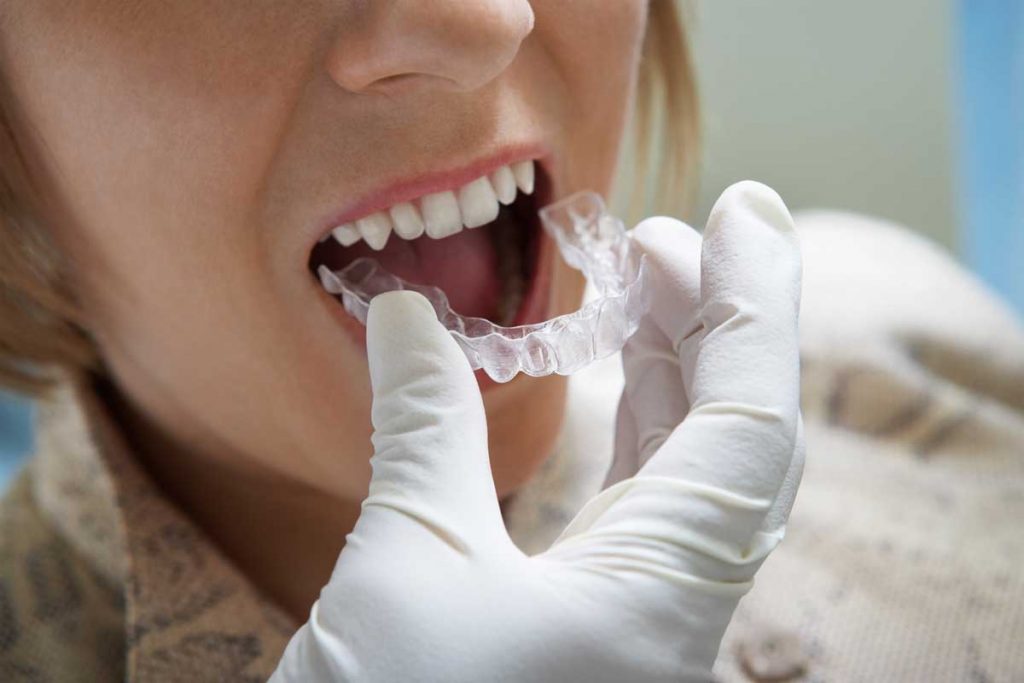Mouth Guard for Teeth Grinding: What to Look for and How it Works
Teeth grinding is a common problem, affecting up to 33% of children at some stage in their development. While adults are slightly less likely to suffer from bruxism, they are more likely to suffer from chronic bruxism or grinding their teeth throughout the night. Bruxism can range in severity, but if left untreated even mild grinding can cause discomfort and permanent damage to your teeth.
When you grind your teeth, the enamel is rubbed thin, making your teeth more sensitive and more prone to cavities and damage. Grinding your teeth can also cause you to suffer from headaches, a stiff neck or jaw, trouble focusing, loose feeling teeth, sore gums, and other discomforts. Often, the best way to reduce the damaging effects of bruxism is with a mouth guard or dental guard.
Why You May Need a Mouth Guard
People who suffer from bruxism, or teeth grinding, often seek out a dental guard to protect their enamel and tooth shape. While you can grind your teeth during the day, when it happens at night, it may go unnoticed. There are several warning signs or contributing factors that may mean you are grinding your teeth:
- You frequently wake up with a sore jaw or headaches
- You chip a tooth
- You suffer from any disorders that affect the nervous system or joints
- You take antidepressants, which may cause you to grind your teeth
- Your teeth become more sensitive, like from losing their enamel
- Your teeth feel loose when you wake up
Teeth grinding can be due to a series of factors or can be a physical response to stress, nervousness, or depression.
How to Choose a Mouth Guard
Your dentist may recommend an occlusal splint, or a custom night guard, generally made by an orthodontist, especially if your grinding is severe, which they can often take molds for in the office. In less severe cases, you may be tempted to save money by ordering your mouth guard from another vendor. Here are some of your options:
- Generic plastic mouth guard or sports guard: These are great for very mild cases of bruxism. You can often find them in the oral care section of your local drugstore or in sports stores. However, mouth guards made for sportswear can often be bulky or uncomfortable.
- “Boil and Bite” mouth guard: These are often found in sports stores, and while they can still be on the bulky side, they provide a more custom fit to help protect your teeth and jaw. You boil them and then bite down on the soft material, which then hardens and creates the perfect fit.
- Order a custom mouth guard online: Many companies offer custom-made mouth guards that you can order from home. They will send you a molding kit with instructions on how to get impressions of your teeth. Then you mail back the impressions and they will create a custom fit mouth guard that will protect your teeth from damage during grinding. These mouth guards can last anywhere from six months to five years and are often much more inexpensive than the in-office version.
Mouthguards come in a variety of different materials in a range of thicknesses and densities. You should choose the material for your mouth guard based on the severity of your bruxism:
- Daytime clenching: There are thin, lightweight, custom mouth guards available that are great for daytime wear to prevent clenching and light grinding. They are often barely noticeable and allow you to speak with ease, though they can be slightly more expensive than basic mouthpieces.
- Mild bruxism/teeth clenching: For grinding that is not severe, you can use a soft mouth guard, generally made of rubber that is around 2 mm thick.
- Moderate bruxism: For moderate grinding, you may be able to wear a hybrid mouth guard. This is typically made of a thicker plastic with a soft rubber lining and around 3 mm thick.
- Severe bruxism: For teeth grinding that is severe and causing serious damage to your teeth, you will need a mouth guard that is thicker and made of a much harder plastic material or rigid acrylic. These are often more expensive but can last for three to five years, even with daily use.
How it Works
A mouth guard puts cushioning between your top and bottom teeth to prevent damage due to grinding. Custom-fit mouth guards help to align your jaw properly to prevent grinding, which can reduce strain on your jaw, neck, and head. In most cases, mouth guard only covers your top teeth, but in special cases, you may need an upper and lower guard.
Over time, your mouth guard will likely begin to wear out from constant grinding and need to be replaced. Depending on the type of mouth guard you choose, you may need to replace it as often as every six months. Mouth guards made of more heavy-duty materials may last longer. Most professionals say you should change your mouth guard when it begins to wear thin, or every five years, whichever is soonest.
Don’t Ignore Your Teeth Grinding
If you learn that you may have teeth grinding, even if you don’t suffer from many of the common discomforts, like headaches or jaw pain, you should not ignore the problem. Over time, constant grinding, even in mild cases, will remove the important enamel from your teeth. The loss of enamel will make your teeth much more sensitive to certain foods, temperatures, and sometimes even to touch, like when brushing. Because enamel protects your teeth, they will also become much more susceptible to cavities as well. Over time, you may begin to experience other discomforts, loose teeth, or you may even chip a tooth.
If you suspect that you have been grinding your teeth at night, or catch yourself grinding them during the day, you may want to visit your dentist for an oral exam. They will be able to lead you in the right direction to choose the best mouth guard for you.
Medically Fact-Checked & Written by Our Dental Editorial Team
You can read more about our editorial guidelines by clicking this link and learn more about the Emergency Dentists USA editorial team here.



